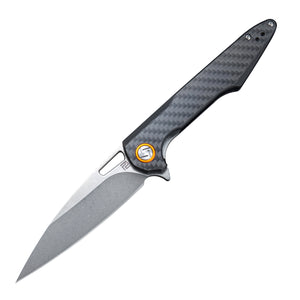Unveiling the Different Types and Designs of Folding Knives
Body
When it comes to versatile and practical tools, folding knives are a popular choice among outdoor enthusiasts, survivalists, and everyday users alike. These compact and portable knives offer convenience and functionality, making them an essential tool in various situations. In this article, we will explore the different types and designs of folding knives, shedding light on their unique features and applications.

Understanding Folding Knives
Folding knives, also known as pocket knives, are designed with a pivot mechanism that allows the blade to fold into the handle. This folding feature makes them easy to carry and store, reducing the risk of accidental injuries. Folding knives come in a wide range of sizes, blade shapes, and locking mechanisms, catering to different needs and preferences.
Types of Folding Knives
There are several types of folding knives available in the market, each designed for specific purposes. Let's take a closer look at some of the most common types:
1. Multi-Tool Folding Knives
Multi-tool folding knives are a popular choice for outdoor enthusiasts and individuals who require a versatile toolset in one compact package. These knives often feature additional tools such as screwdrivers, bottle openers, and can openers, making them handy for various tasks. They are commonly used for camping, hiking, and everyday tasks that require multiple functions.
2. Tactical Folding Knives
Tactical folding knives are designed with durability and versatility in mind. These knives are commonly used by military personnel, law enforcement officers, and survivalists. They often feature a sturdy construction, ergonomic handles, and specialized blade designs for self-defense and utility purposes. Tactical folding knives are known for their reliability and performance in challenging situations.
3. Gentleman's Folding Knives
Gentleman's folding knives, also known as dress knives, are designed with elegance and style in mind. These knives often feature high-quality materials, such as exotic wood handles and premium blade steels. They are commonly used as accessories or for light everyday tasks. Gentleman's folding knives are appreciated for their aesthetic appeal and refined craftsmanship.
4. Traditional Folding Knives
Traditional folding knives, also known as slip joint knives, have a rich history and are deeply rooted in tradition. These knives often feature classic designs, such as the iconic pocket knife with two or three blades. Traditional folding knives are known for their simplicity, reliability, and timeless appeal. They are commonly used for everyday tasks, such as opening packages or cutting ropes.
Design Features of Folding Knives
Now that we have explored the different types of folding knives, let's delve into the various design features that make them unique:
1. Blade Shape
The blade shape of a folding knife plays a crucial role in its functionality. There are various blade shapes to choose from, including drop point, tanto, clip point, and spear point. Each blade shape offers different advantages and is suited for specific tasks. For example, a drop point blade is versatile and suitable for general-purpose use, while a tanto blade is known for its strength and piercing capabilities.
2. Locking Mechanisms
Locking mechanisms are essential for ensuring the safety and stability of a folding knife's blade. Common locking mechanisms include liner locks, frame locks, and lockbacks. These mechanisms secure the blade in an open position, preventing accidental closures during use. It is important to choose a folding knife with a reliable locking mechanism that suits your needs and preferences.
3. Handle Materials
The handle material of a folding knife not only affects its aesthetics but also its durability and grip. Common handle materials include stainless steel, aluminum, G-10, and various types of wood. Each material offers different levels of strength, weight, and texture. It is important to choose a handle material that provides a comfortable and secure grip for optimal control and usability.
4. Opening Mechanisms
Opening mechanisms determine how a folding knife can be deployed. Common opening mechanisms include thumb studs, flipper tabs, and thumb holes. These mechanisms allow for quick and easy one-handed opening, enhancing the knife's accessibility and usability. It is important to choose an opening mechanism that suits your preference and ease of use.
Unveiling the different types and designs of folding knives has provided us with a comprehensive understanding of these versatile tools. Whether you are an outdoor enthusiast, a collector, or simply in need of a reliable everyday tool, there is a folding knife out there that suits your needs. Remember to choose a folding knife that aligns with your intended use, preferences, and budget.
Conclusion
In conclusion, folding knives offer a compact and portable solution for various cutting and utility tasks. The different types and designs of folding knives cater to different needs and preferences, ranging from multi-tool functionality to elegant aesthetics. Understanding the blade shapes, locking mechanisms, handle materials, and opening mechanisms is crucial in selecting the right folding knife for your specific requirements.
References:
2. Knife Center
3. Blade HQ






Comments